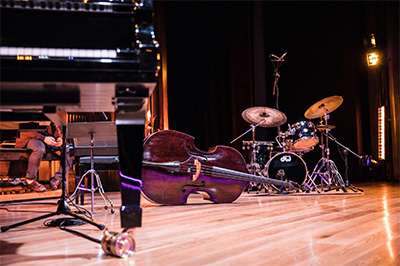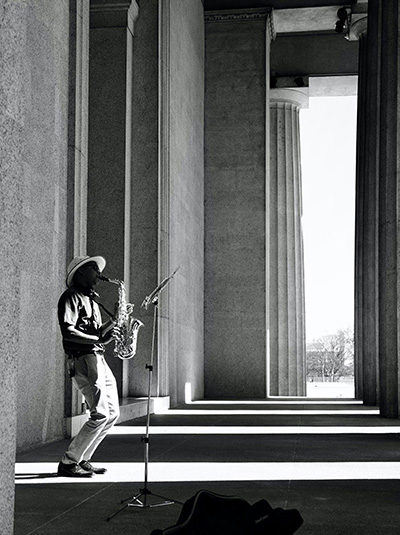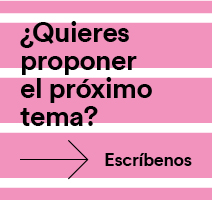Give your opinion
If orchestras were NOT liberal
On this occasion we have the participation of Alonso Schlatter, 4th year student of Philosophy, who wanted to debate and counterargue the previous article of this section. If orchestras were liberal by Asís Cortés. Alonso shares his perspective, exposes that of other intellectuals and, in addition, leaves us musical recommendations that you can not stop listening to. And you, do you think orchestras are or are not liberal?
Beauty as well as good and truth contain in their very concept the notion of order. Politics also contains within itself this notion. But there are two kinds of order: order in relation to another and order in relation to oneself. Order in relation to oneself can be called coherence, vital unity, prudence -but a prudence not understood in a moralizing tone, but in a moralizing tone. to act in a way that makes sense for oneself1- and, musically, it is understood as a chord (e.g., C major) with itself; the order in relation to another can be understood as rapport,  concordance, affinity and, musically, counterpoint. Curiously, what human beings enjoy most is counterpoint, and that is why J. S. Bach is always considered among the three best composers of classical music in history. But there is also counterpoint in the electronic song. Say my name of David Ghetta, Bebe Rexha and J Balvin, or in The fools by C. Tangana and, more evidently, in songs such as The Sound of Silence by Simon and Garfunkel.
concordance, affinity and, musically, counterpoint. Curiously, what human beings enjoy most is counterpoint, and that is why J. S. Bach is always considered among the three best composers of classical music in history. But there is also counterpoint in the electronic song. Say my name of David Ghetta, Bebe Rexha and J Balvin, or in The fools by C. Tangana and, more evidently, in songs such as The Sound of Silence by Simon and Garfunkel.
We love counterpoint because it is an ideal of universal functioning: if only everything complemented and interpenetrated in the same way as those two melodies that are beautiful when separated and even more so when joined together. Above all, this reality responds to a deep yearning of the human being: Plato calls it erotic love, which seeks that psychic union with the loved object even more than the physical union: to be the perfect counterpoint of another person! That is what many people look for and admire when they see it in couples and friends ("they completed each other's sentences"; "you could tell they understood each other super well", for example), and it is the very reason why The Beatles are a historical band: before they were famous they already spent hours and hours for days and months playing together, knowing each other's weaknesses and exploiting each other's strengths. This is also why friction makes love, namely because in the process of getting to know each other and being able to give up certain aspects of oneself in order to improve the relationship itself. It is the experience of many composers to have to give up a beautiful melodic line to match it with its counterpoint, or to make it less forced and better, knowing that the counterpoint -that is, the relationship- will be more beautiful if it is Withdrawal to the beauty and perfection of the melodies separately.
 But, then, what about liberalism or republicanism -in the classical sense-? What is the reason for the explanation given so far? Well, it is the necessary premise to disprove what Asís Cortés points out as "point core topic in Professor Cruz's theory".2the notion of common good. We are of agreement in that it would be precious the orchestra that, conformed by millions of musicians, would result as a unitary and perfect whole, where the novice as well as the amateur and the professional has the capacity to have this order in relation to another and to follow the rhythm of the others. But there is a radical flaw in this theory, which is the refutation of both Álvaro D'Ors and Montserrat Herrero, namely, that with the common good it is enough that one is not at agreement for it not to exist.. And the fact is that being against the common good is not so much playing another piece as detune the set piece. Because society -for a greater coherence and amplitude in the metaphor- must be in itself an unrenounceable symphony for the musician. More concretely, it would be a symphony in which only the basso continuo is composed so that the instrumentalist may play with freedom a melody staff on the basis of what is foreseen as the correct basso continuo -framework legal- correct. Anything that deviates from this undeniable basis is called disorder, chaos, crime, and this would be exemplified in the musician's detuning, which can be voluntary or involuntary.3.
But, then, what about liberalism or republicanism -in the classical sense-? What is the reason for the explanation given so far? Well, it is the necessary premise to disprove what Asís Cortés points out as "point core topic in Professor Cruz's theory".2the notion of common good. We are of agreement in that it would be precious the orchestra that, conformed by millions of musicians, would result as a unitary and perfect whole, where the novice as well as the amateur and the professional has the capacity to have this order in relation to another and to follow the rhythm of the others. But there is a radical flaw in this theory, which is the refutation of both Álvaro D'Ors and Montserrat Herrero, namely, that with the common good it is enough that one is not at agreement for it not to exist.. And the fact is that being against the common good is not so much playing another piece as detune the set piece. Because society -for a greater coherence and amplitude in the metaphor- must be in itself an unrenounceable symphony for the musician. More concretely, it would be a symphony in which only the basso continuo is composed so that the instrumentalist may play with freedom a melody staff on the basis of what is foreseen as the correct basso continuo -framework legal- correct. Anything that deviates from this undeniable basis is called disorder, chaos, crime, and this would be exemplified in the musician's detuning, which can be voluntary or involuntary.3.
If the common good were a symphony already composed and given in advance, where would the real freedom be? Is it possible to program a long-term plan of action deadline if it is not only to establish a framework of action according to clear rules that do not intrude on the individuality of each person? No... it is not possible! It is true that "the human being, as a social being by nature, is called to goods that surpass his particular good", but is it exactly "in the same way that a musician is called to be able to play with other musicians and achieve together the common good of a symphony, a good that is unattainable individually"? I argue that it is not, and that although Beethoven's Ninth is a colossal work, I understand that there are those who prefer Mahler's Resurrection . There is no perfect choice, but a propitious legal framework that allows its members to perfect themselves. The unrealistic utopia that we will all be sufficiently educated in intelligence and will to follow the same common good is just that: a utopia. The moments in which a nation comes together in a surprising way are only in extreme situations, because it is such situations that are capable of integrating logos with pathos and ethos in an effective way. Only in the individual action of a specific person is it possible to unify these three elements, but it is impossible for 48 million Spaniards to unite in the same common good because there is a true plurality and diversity in today's society that cannot be labeled or categorized (in the sense of labeling or boxing). That is why Rawls wrote his Theory of Justice in 1971, because the real question in today's world is how to unite the different: how to make a theory that, aware of the great social diversity, is able to make as common as possible a framework of justice.
 Liberalism aims to protect individual freedom and the minimum possible intervention of the State. Orchestras are, in fact, liberal since the only way it could not be so would be with robot musicians governed by the orchestra's director . But what happens? The orchestral director only sets the expressiveness and tempo to be followed. The composer is the one who creates the propitious legal framework -which above we have called "basso continuo"- to ensure a minimum balance between the parts. Ah... yes... orchestras are liberal! And it is the precise example to be in favor of liberalism. Because the State, following this example, plays jazz. It improvises (it must improvise because there is no reality equal to a previous one!) on a necessary basis for a minimum performance that extends over time (because otherwise there would be a clear instability).
Liberalism aims to protect individual freedom and the minimum possible intervention of the State. Orchestras are, in fact, liberal since the only way it could not be so would be with robot musicians governed by the orchestra's director . But what happens? The orchestral director only sets the expressiveness and tempo to be followed. The composer is the one who creates the propitious legal framework -which above we have called "basso continuo"- to ensure a minimum balance between the parts. Ah... yes... orchestras are liberal! And it is the precise example to be in favor of liberalism. Because the State, following this example, plays jazz. It improvises (it must improvise because there is no reality equal to a previous one!) on a necessary basis for a minimum performance that extends over time (because otherwise there would be a clear instability).
At final, if the orchestras were not liberal there would be no real freedom, that is, we would be more determined than conditioned to act in one way or another. That "the freedom that liberalism allows consists in choosing between brands of detergent"? Yes -although that is more of capitalism than of liberalism itself-, but it also allows me to fulfill myself without depending on Levi being for agreement or against my ideals and principles. And, I say more: liberalism allows the choice between brands of detergent... and of much more important things. The use of freedom is, in final, proper to the Education and will of each one. I am not saying that the notion of the common good is not a desirable good or end, but I am saying that it would only be possible, in such a case, in much smaller groups. The real contemporary question for society is how to articulate the enormous diversity of people in the world so that everyone has a place in our world. Aristotle could not even think of a reality similar to that of our time because such religious, ethnic, social, economic and ideological diversity was unknown in the 4th century BC....
1.- «El hombre, cuya entelequia fuera ser ladrón tiene que serlo, aunque sus ideas morales se opongan a ello, repriman su incanjeable destino y logren que su vida efectiva sea de una correcta civilidad. […] No se confunda, pues, el deber ser de la moral, que habita en la región intelectual del hombre, con el imperativo vital, con el tener que ser de la vocación personal, situado en la región más profunda y primaria de nuestro ser», Ortega y Gasset, J., Pidiendo un Goethe desde dentro, p. 406. < http://agendadefilosofia.mywebcommunity.org/arc/ortega_goethe.pdf >.
CORTÉS, A., Si las orquestas fueran liberales, BeBrave: Opinar.
I speak of dissonance and not of dissonance, because dissonance is the engine of change: it is a tension prior to a more satisfactory resolution. Furthermore, the distinction between "voluntary" or "involuntary" in actions is a topic of central importance for law.
gradeThe previous article has been in response to the article that my colleague Asís Cortés published in this same magazine a month ago. Beyond what it may seem, it is not a mere stay in the example and try to see the errors of this one, but to use precisely the same model to counterargue with the same tools.
If you liked the article, you might be interested in one of our Degrees!










